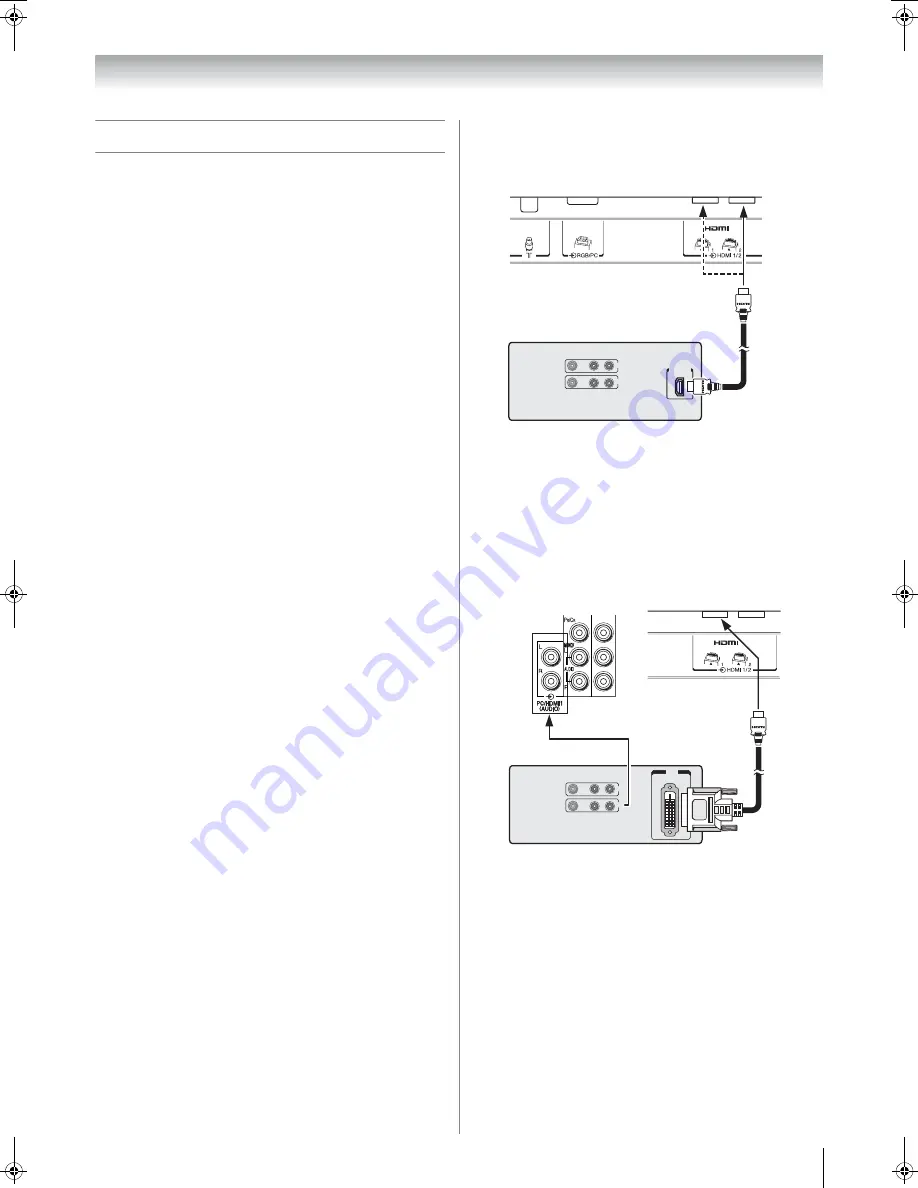
Toshiba 5257Z3500A(
E
)
29
Connecting your TV
Connecting an HDMI or DVI device
• When turning on your electronic components, turn on the
TV first, and then the HDMI or DVI device.
• When turning off your electronic components, turn off the
HDMI or DVI device first, and then the TV.
• This TV may not be compatible with features and/or
specifications that may be added in the future.
• This TV is only operable with L-PCM on 32/44.1/48 kHz
and 16/20/24 bits. If there is no sound when using HDMI,
use the analog audio cables to connect the TV and the HDMI
device, and select
Analog
in
HDMI1 audio
of the
AV
connection
menu (
-
page 31).
• This TV is able to connect with HDMI devices. But it is
possible that some HDMI devices may not operate properly
with this TV.
Connecting an HDMI or DVI device
The HDMI input on your TV receives digital audio and
uncompressed digital video from an HDMI device or
uncompressed digital video from a DVI device.
This input is designed to accept HDCP program material in
digital from EIA/CEA-861/861D compliant consumer
electronic devices (such as a set top box or DVD player with
HDMI or DVI output).
The HDMI input is designed for best performance with 1080i
(50 Hz/60 Hz) and 1080p (50 Hz/ 60 Hz) high-definition video
signals, but will also accept and display 480i, 480p, 576i, 576p,
720p (50 Hz/60 Hz) and VGA signals.
• HDMI: High-Definition Multimedia Interface
• DVI: Digital Video Interface
• HDCP: High-bandwidth Digital Content Protection
• EIA/CEA-861/861D compliance covers the transmission of
uncompressed digital video with high-bandwidth digital
content protection, which is being standardized for
reception of high-definition video signals. Because this is an
evolving technology, it is possible that some devices may
not operate properly with the TV.
• VGA: VESA 640
5
480 @ 60 Hz
• L-PCM: Linear-Pulse Code Modulation
Note:
Some of legacy HDMI sources may not work properly with your
latest HDMI TV, due to the adoption of a new standard. Please
try to disconnect your HDMI cable first and then to set
Off
the
following three options (
Lip Sync
,
Deep Color
,
xvYCC
). Your
legacy HDMI source should operate properly with your TV.
(
-
page 31).
Connecting an HDMI device
One HDMI cable (type A connector)
For proper operation, it is recommended that you use a short
HDMI cable.
HDMI cable transfers both video and audio.
The HDMI3 terminal is located at the side of the TV.
Connecting a DVI device
One HDMI (type A connector)-to-DVI adapter cable and
audio cables
HDMI (type A connector)-to-DVI adapter cable
The recommended HDMI-to-DVI adapter cable length is 2m.
Standard analog audio cables
An HDMI-to-DVI adapter cable transfers only video.
Separate analog audio cables are required.
Note:
HDMI, the HDMI logo, and High-Definition Multimedia
Interface are trademarks or registered trademarks of HDMI
Licensing, LLC.
VIDEO
AUDIO
L
R
IN
OUT
HDMI OUT
TV back view
HDMI device
VIDEO
AUDIO
L
R
IN
OUT
DVI
OUT
TV back view
TV back view
DVI device
5257Z3500.book Page 29 Wednesday, October 24, 2007 6:34 PM








































